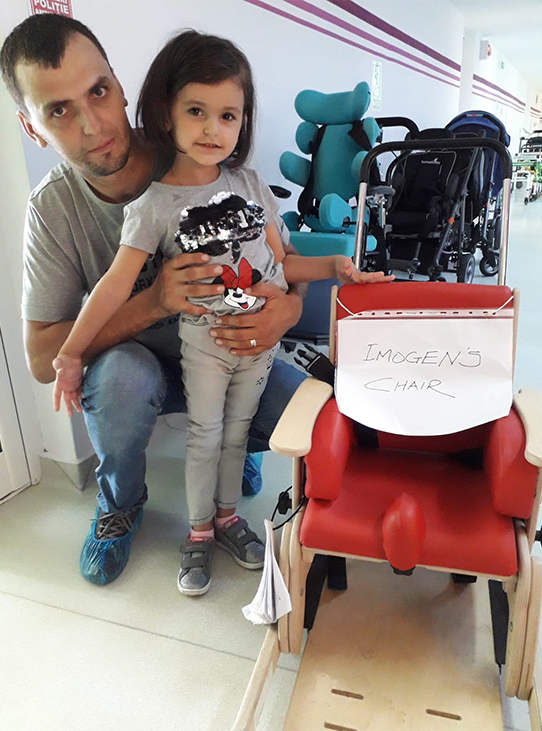It was in 2004, during a visit to the Bielave Children’s Home in Sarajevo, that the seeds for the charity PhysioNet were first planted.
The charity Hope and Homes for Children (HHC) invited Peter Thompson, a Rotarian from the Knaresborough club in North Yorkshire, to visit the Bosnian capital which, less than 10 years earlier, had been besieged for 1,425 days when 13,952 people were killed, many of them civilians.
“While I was visiting the home, the volunteer physiotherapist working there asked for various items of paediatric physiotherapy equipment which could not be obtained in Bosnia,” recalled Peter.
“Returning to Britain after finishing a pre-retirement job in Ethiopia, I found it surprisingly easy to collect the required items. So, in 2005, a colleague and I drove a van-load of physiotherapy equipment out to Sarajevo.”
“It soon became obvious that it was possible to collect far more equipment than a single organisation could absorb,” explained Peter.
“After helping HHC it also became evident that the only way of transporting equipment economically was in 40-foot shipping containers or, in Europe, by using HGV trucks.”
“Through collaboration with the Margaret Carey Foundation, prisoners in the UK refurbish wheelchairs for PhysioNet, before they are dispatched abroad. ”
It was apparent that PhysioNet had found a niche – a need for specialised equipment, which the charity was able to easily source.
By 2009, the first containers were sent to South Africa and Fiji, and by 2018 PhysioNet was serving 25 countries having sent out 75 container loads. In May this year, the Spinal Injury Association of Fiji received its 14th consignment from PhysioNet, which included mobility devices and medical consumables.
On average each container holds more than 500 items. In total, 37,270 items were dispatched abroad between 2009 and 2018, including 6,188 items of therapy equipment and 11,688 wheelchairs.
The potential saving to the often cash-strapped homes and physiotherapy centres, working with adults and children with disabilities in developing countries and Eastern Europe, is enormous.
TGA Mobility, nationwide motor scooter specialist, @TGAMobility have made a donation of quality used wheelchairs to Physionet – with support from the Rotary Club of Saffron Walden
Thanks TGA!Picture – PhysioNet gratefully receives the donated wheelchairs from TGA Mobility. pic.twitter.com/BQGnFsUOtd
— PhysioNet (@PhysioNetYork) November 25, 2019
“Therapy equipment is particularly expensive,” added Peter. ”As new, these items would cost over £7 million.”
He also pointed out that, in the current spirit of being environmentally sensitive, the charity has managed to recycle around 500 tonnes of usable equipment from hospitals, special schools, wheelchair services, residential and nursing homes, companies and private individuals which would otherwise have gone to UK scrapyards.


Between 2009 and 2018, PhysioNet have dispatched over 37,000 wheelchairs and therapy items. 7-year-old Imogen from West Yorkshire donated her chair, which she’d grown out of, to help another child.
Through collaboration with the Margaret Carey Foundation, prisoners in the UK refurbish wheelchairs for PhysioNet, before they are dispatched abroad.
“PhysioNet’s work can sometimes seem like a game of logistics and statistics but just one of many instances illustrates the charity is really about people, not just practicalities,” said Peter.
“Imogen, a seven-year-old from a school in West Yorkshire got to know about PhysioNet and very much wanted to donate her redundant paediatric chair, which she had grown out of, to a young person in another country.
“PhysioNet’s Chairman, Rotarian Mike Adams, from Horbury and Ossett Phoenix Rotary, near Wakefield, went along to the school to collect the chair and meet both Imogen and her teachers.
“To say that Imogen was excited at the thought of helping someone else, was an understatement.
In total, 37,270 items were dispatched abroad between 2009 and 2018, including 6,188 items of therapy equipment and 11,688 wheelchairs.
“The chair was transported to our North Yorkshire depot where it was prepared for a shipment, bound for Romania. Soon after, Imogen’s chair went to a young girl named Georgiana who lives in Bucharest and attends the Maria Beatrice Centre in Romania.
“Another of our wheelchairs was sent to Zimbabwe and given to Emmanuel who was born with a disability. He is a happy little boy and with his new mode of transport he will be able to attend school.”
PhysioNet is not a Rotary charity, but it is strongly supported, both financially and in kind, by Rotarians and Rotary clubs across Great Britain & Ireland.
PhysioNet has a busy collection and distribution hub in the South West of England where a private benefactor generously provides storage for overseas shipments, giving a very positive effect to the charity’s carbon footprint.
“I have visited Inverness Culloden Rotary Club who will be spearheading a project with the Highland NHS to recover some 4,000 redundant wheelchairs which will be recycled and dispatched directly to developing countries around the world,” added Mike.
“Another of our wheelchairs was sent to Zimbabwe and given to Emmanuel… with his new mode of transport he will be able to attend school.”
“I am hoping we will be able to work with Her Majesty’s Prison Inverness as part of a restorative justice programme to refurbish the wheelchairs.”
A further example of the Rotary partnership is in Essex, where over the last four years, Saffron Walden Rotary has been collecting surplus mobility and physiotherapy equipment from all over East Anglia, London and the Home Counties which they then deliver to the charity’s Yorkshire base.
They supply about 50% of all equipment the charity collects, undertaking the collection and deliveries in their own van. They have also donated a van for the charity’s use, supported by Rotary clubs from all over the country which have made cash donations.
PhysioNet is strongly supported, both financially and in kind, by Rotarians and Rotary clubs across Great Britain & Ireland.
PhysioNet’s volunteer healthcare professionals continue to monitor the ‘fitness for purpose’ of the equipment.
They have also made numerous visits to recipients in different countries, providing training for local physios and teachers, while helping to assemble, maintain and adjust equipment, matching items to user needs.
In addition, and largely due to help from Rotary’s Wheelchair Foundation, a number of clubs, particularly in South Africa, have received shipments from PhysioNet.
The needs of people with disabilities overseas is great, please help.
Rotary volunteers can identify unwanted equipment in the community, help with collections, set up local collection points and financially sponsor an all-volunteer charity which has been the recipient of the Queen’s Award for Voluntary Service.
Find out more about PhysioNet by visiting their website.


























































